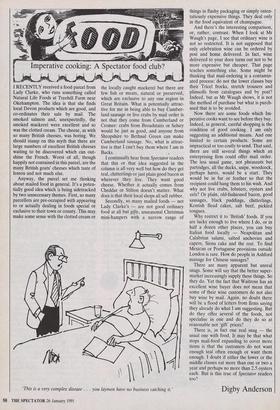Imperative cooking: A Spectator food club?
,,__SLALA
•
I RECENTLY received a food parcel from Lady Clarke, who runs something called Natural Life Foods at Treehill Farm near Okehampton. The idea is that she finds local Devon products which are good, and co-ordinates their sale by mail. The smoked salmon and, unexpectedly, the smoked mackerel were excellent and so was the clotted cream. The cheese, as with so many British cheeses, was boring. We should stamp on this myth that there are large numbers of excellent British cheeses waiting to be discovered which can out- shine the French. Worst of all, though happily not contained in this parcel, are the many British goats' cheeses which taste of lemon and not much else.
Anyway, the parcel set me thinking about mailed food in general. It's a poten- tially good idea which is being sidetracked by two unnecessary themes. First, so many parcellers are pre-occupied with appearing to or actually dealing in foods special or exclusive to their town or county. This may make some sense with the clotted cream or the locally caught mackerel but there are few fish or meats, natural or preserved, which are exclusive to any one region in Great Britain. What is potentially attrac- tive for me in being able to buy Cumber- land sausage or live crabs by mail order is not that they come from Cumberland or Cromer: crabs from Broadstairs or Selsey would be just as good, and anyone from Shropshire to Bethnal Green can make Cumberland sausage. No, what is attrac- tive is that I can't buy them where I am in Bucks.
I continually hear from Spectator readers that this or that idea suggested in the column is all very well but how do they get teal, chitterlings or just plain good bacon in wherever they live. They want good cheese. Whether it actually comes from Cheddar or Stilton doesn't matter. What does is that their local shops all sell rubber.
Secondly, so many mailed foods — not Lady Clarke's — are not good ordinary food at all but gifts, unseasonal Christmas mini-hampers with a narrow range of `This is a very complex disease . . . you laymen have no business catching it.' things in flashy packaging or simply osten- tatiously expensive things. They deal only in the food equivalent of champagne.
And there's the interesting comparison, or, rather, contrast. When I look at Mr Waugh's page, I see that ordinary wine is not so restricted. It is not supposed that only celebration wine can be ordered by post and home delivered. In fact, wine delivered to your door turns out not to be more expensive but cheaper. That page teaches something else. Some might be thinking that mail-ordering is a contamin- ated process: do not the lower classes buy their Tricel frocks, stretch trousers and plimsolls from catalogues and by post? Indeed, but as Mr Waugh shows, it is not the method of purchase but what is purch- ased that is to be avoided.
Now there are some foods which Im- perative cooks want to see before they buy. Indeed, in general, careful shopping is the condition of good cooking. I am only suggesting an additional means. And one limited to certain products. Some are impractical or too costly to send. That said, there are still several things which an enterprising firm could offer mail order. The less usual game, not pheasants but partridges, all the ducks, snipe, woodcock, perhaps hares, would be a start. They would be in fur or feather so that the recipient could hang them to his wish. And why not live crabs, lobsters, oysters and eels? Or plain, old-fashioned bacon, good sausages, black puddings, chitterlings, Kentish flead cakes, salt beef, pickled tongues.
Why restrict it to 'British' foods. If you are lucky enough to live where I do, or in half a dozen other places, you can buy Italian food locally — Neapolitan and Calabrian salami, salted anchovies and capers, Siena cake and the rest. To find Mexican or Portuguese provisions outside London is rare. How do people in Ashford manage for Chinese sausages?
There are many apparent but unreal snags. Some will say that the better super- market increasingly supply these things. So they do. Yet the fact that Waitrose has an excellent wine buyer does not mean that some of their wine customers do not also buy wine by mail. Again, no doubt there will be a flood of letters from firms saying they already do what I am suggesting. But do they offer several of the foods, not specialise in one and do they do so at reasonable not 'gift' prices?
There is, in fact one real snag — the usual one with food. It may be that what stops mail-food expanding to cover more items is that the customers do not want enough teal often enough or want them enough. I doubt if either the lower or the middle classes eat more than one or two a year and perhaps no more than 2.5 oysters each. But is this true of Spectator readers too?
Digby Anderson


























































 Previous page
Previous page